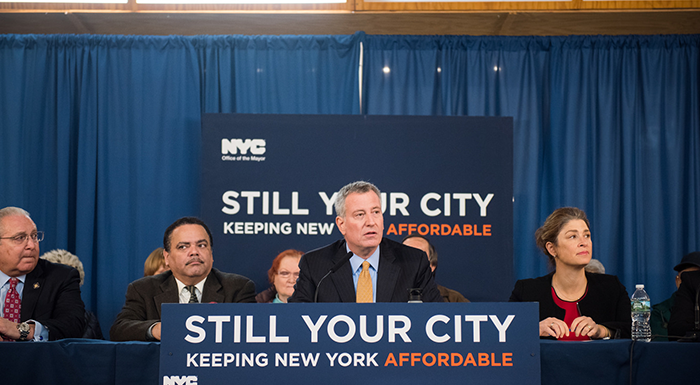Photo Courtesy of Edwin Torres/Mayoral Photography Office
The City’s new plan, according to Mayor de Blasio, builds “on the incredible affordable housing accomplishments of our first term.”
By Forum Staff
Mayor Bill de Blasio recently released the City’s “Housing New York 2.0” plan, laying out new tools and programs to build and preserve affordable homes for 300,000 Gotham families by 2026 – up from the previously announced goal of 200,000 homes by 2024.
According to the administration, under the accelerated and expanded plan, the City will boost the number of affordable homes for seniors and families to 25,000 per year, while also increasing resources and strategies for affordable homeownership programs and not-for-profit organizations purchasing rent-regulated buildings to preserve affordability. The resources and strategies actually will help create 200,000 affordable homes two years ahead of schedule—by 2022—de Blasio said.
According to the Hizzoner, since the original Housing New York initiative launched in 2014, the City has: financed the creation or preservation of affordable homes for more than 78,000 households across the five boroughs; tripled the share of affordable housing for households earning less than $25,000; and doubled funding for housing construction and preservation.
The administration indicated that Housing NY 2.0 pledges to:
• Create more homes for seniors by setting aside underutilized public lots for new affordable senior housing, and make new and preserved affordable housing accessible to seniors and people with disabilities.
• Build a firewall against displacement in fast-changing neighborhoods by helping non-profits purchase as many as 7,500 traditional rent-stabilized apartment buildings and keep them affordable to current residents.
• Protect affordability at Mitchell-Lama buildings, which represent some of the last already existing affordable homeownership opportunities.
• Unlock affordable homeownership to help low- and moderate-income New Yorkers build equity, improve the quality of their homes, and stabilize city neighborhoods by financing construction of co-operatives and condominiums for first-time home buyers and by offering home-repair loans.
• Unlock the potential of vacant lots long considered too small or irregular for traditional housing with innovative smaller homes, and develop more affordable housing on lots long used for parking at existing Mitchell-Lama and federally regulated senior affordable housing complexes.
• Capitalize on advances in technology and innovative design to expand modular building and micro-units that can lower the cost of construction, build new homes faster, and respond to the city’s changing demographics.
“I am pleased that the City’s new open-door financing program will promote the construction of cooperative and condominium buildings,” said City Councilman Barry Grodenchik (D-Oakland Gardens), a member of the Council committees on Land Use and Housing and Buildings. “Representing tens of thousands of residents of co-operative and condominium housing units, I know that co-operative and condominium housing can make the dream of home ownership a reality for New Yorkers. At the same time, the home fix program will help New Yorkers stay in their homes by providing financing for necessary repairs; I worked on a similar program in the Queens borough president’s office and saw how impactful it was.”
De Blasio noted that HNY 2.0 requires an additional $150 million per year in the current four-year financial plan, bringing the City’s investment in achieving the 100,000 more homes – or 300,000 total homes – to about $1.3 billion per year over the next nine years.

